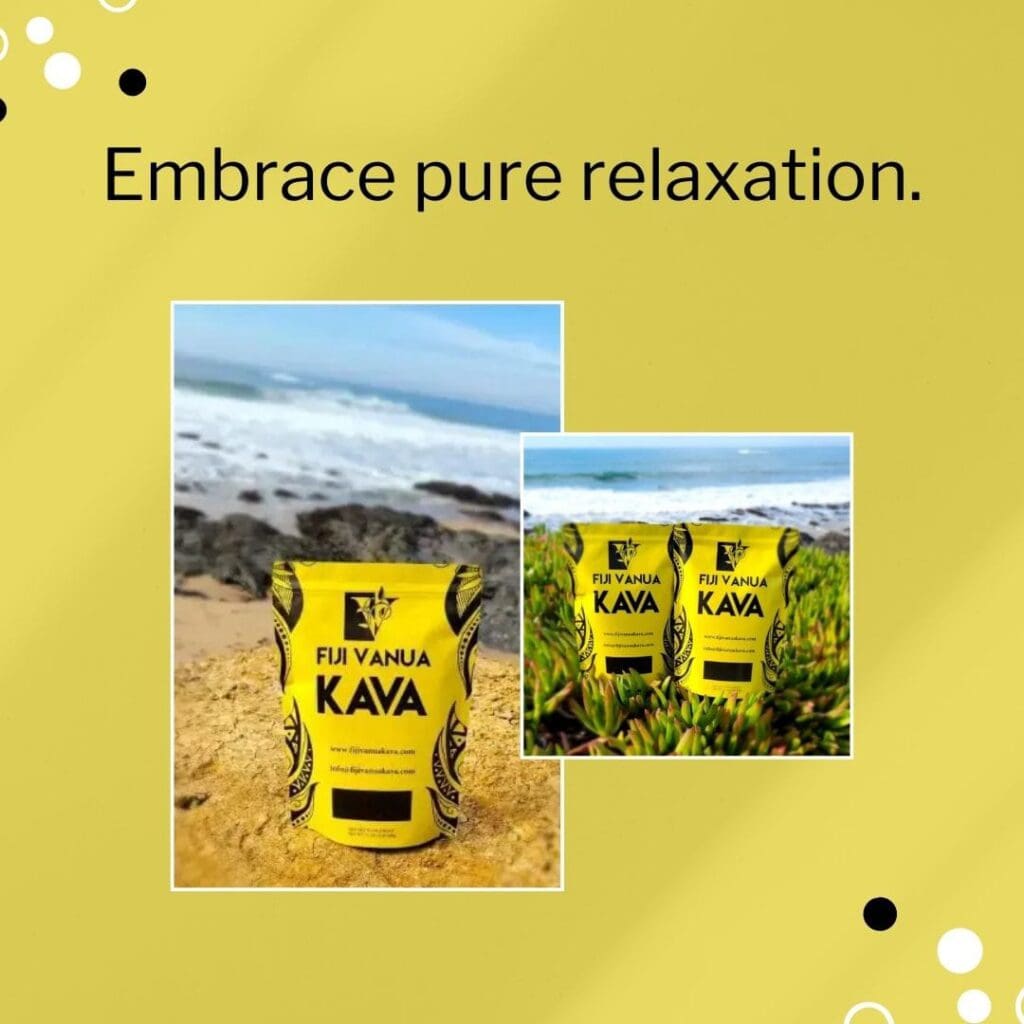The Science Behind Kava
In the heart of the Pacific Islands, a tradition has endured for centuries, a ritual that offers solace, camaraderie, and a sense of tranquility. This tradition revolves around a unique plant, Piper methysticum, known as kava. For generations, kava has been consumed as a ceremonial drink, its roots steeped in water to create a soothing beverage with remarkable properties.
Beyond the cultural significance of kava, it has gained widespread attention in recent years as a potential natural remedy for stress and anxiety. As the world grapples with increasing pressures and demands, many seek alternatives to traditional pharmaceuticals. Kava, with its rich history and promising scientific evidence, offers a glimpse into a more holistic approach to well-being. Let’s delve into the science behind kava and understand how it works to promote relaxation.
Kavalactones: The Key Active Compounds
The unique properties of kava can be attributed to its active compounds, known as kavalactones. These chemical substances are responsible for the plant’s calming and relaxing effects. There are six primary kavalactones, each with its distinct characteristics:
- Kawain: This is one of the most abundant kavalactones and is believed to be primarily responsible for kava’s anxiolytic effects.
- Dihydrokawain: Similar to kavain, dihydrokavain also contributes to kava’s calming properties.
- Methysticin: Methysticin is another significant kavalactone with potential anxiolytic and muscle relaxant effects.
- Dihydromethysticin: A derivative of methysticin, dihydromethysticin is also believed to contribute to kava’s therapeutic benefits.
- Yangonin: Yangonin is known for its sedative and hypnotic properties, although it may also have anxiolytic effects.
- Desmethoxyyangonin: A minor kavalactone, desmethoxyyangonin has been shown to have potential anti-inflammatory properties.

The specific combination and concentrations of these kavalactones in kava root can vary depending on factors such as the plant’s variety, growing conditions, and processing methods. This variation can influence the overall potency and effects of kava.
How Kavalactones Affect the Brain: A Molecular Mechanism for Relaxation
Kava’s calming effects are primarily attributed to its unique blend of active compounds known as kavalactones. These substances work by interacting with specific neurotransmitters in the brain, particularly GABA (gamma-aminobutyric acid).
Enhanced GABA effects
GABA is a key chemical in the brain that regulates the communication between nerve cells. It acts as a “brake” on the brain, reducing the excitability of neurons and promoting a sense of relaxation. When GABA levels are balanced, the brain can function optimally without excessive stimulation.
Kavalactones, such kawain and dihydrokawain, are believed to enhance the effects of GABA by binding to GABA receptors. This binding increases the activity of GABA, leading to a more pronounced inhibitory effect on neurons. In essence, kavalactones help to amplify the brain’s natural calming mechanisms.
Increase dopamine levels
Kavalactones can stimulate the release of dopamine, a neurotransmitter associated with pleasure and reward. Kavalactones could also interact with dopamine receptors in the brain, affecting their sensitivity or activity. This could lead to changes in mood and relaxation.
Serotonin reuptake inhibition
Serotonin is a neurotransmitter that plays a crucial role in mood regulation, sleep, appetite, and other functions. It is often associated with feelings of well-being and happiness. Kavalactones work by inhibiting the reuptake of serotonin in the brain. This means that more serotonin remains in the synapses, where it can exert its effects on mood and other functions. It works similarly to some antidepressants.
The Relaxation Response: How Kava Helps the Body Unwind
Kava produces a range of physical effects that contribute to its overall calming properties. These effects include:
- Muscle Relaxation: Kava has been shown to reduce muscle tension and promote relaxation. This can be particularly beneficial for individuals experiencing physical stress or tension related to anxiety.
- Reduced Heart Rate: Kava can help lower heart rate, which can contribute to a sense of calm and reduce the physiological symptoms associated with anxiety, such as rapid heartbeat and sweating.
- Easing of Tension: By promoting muscle relaxation and reducing heart rate, kava can help alleviate feelings of tension and stress. This can lead to a greater sense of overall well-being and mental clarity.
- Improved sleep quality: Many people report improved sleep quality after consuming kava, likely due to its calming effects on the mind and body.
- Enhanced cognitive function: While kava is primarily known for its relaxing properties, some studies suggest that it may also improve cognitive function and mental clarity. This can be particularly beneficial for individuals who experience anxiety-related cognitive difficulties.
Kava vs. Other Relaxants: A Comparison
While other relaxants like alcohol can be effective in reducing anxiety, they often come with significant side effects.
The Drawbacks of Traditional Relaxants:
- Excessive Sedation and Cognitive Impairment: Alcohol and benzodiazepines, while effective for anxiety relief, can make you feel overly drowsy, sluggish, and unable to think clearly. This can hinder daily activities and decision-making.
- Addiction Potential: Medications and alcohol can lead to dependence, making it difficult to stop using them without withdrawal symptoms.
- Liver Damage: Alcohol is notorious for its negative effects on the liver.
Kava’s Potential Advantages:
- Promotes Relaxation without Drowsiness: One of the key advantages of kava over other relaxants like alcohol is its ability to promote relaxation without causing excessive sedation or cognitive impairment. You could potentially feel calmer and less anxious without feeling too sleepy or foggy.
- Reduced Risk of Addiction: The current understanding suggests a lower risk of dependence on kava compared to benzodiazepines.
- Safer for the Liver: Studies on pure kava have indicated that it does not cause any harm to liver function.
Kava vs. Anxiety Medications: A Natural Alternative
Kava’s appeal lies in its natural origins and the research shows its potential for a more holistic approach to anxiety management and sleep quality as a clinical nutrient. Unlike many pharmaceutical drugs, kava is derived from a plant and has been used traditionally for centuries. This natural heritage can be appealing to those seeking alternatives to synthetic medications. Kava offers a distinct advantage over traditional anxiety medications like benzodiazepines, SSRIs, or alcohol: it is generally considered a safer option.
- Benzodiazepines: These medications can be highly effective for short-term anxiety relief, but they carry a risk of addiction and can cause cognitive impairment, especially with prolonged use. Kava, on the other hand, does not typically lead to addiction and is less likely to impair cognitive function.
- SSRIs (Selective Serotonin Reuptake Inhibitors): While SSRIs are often prescribed for chronic anxiety disorders, they can take several weeks to produce noticeable effects and may have side effects such as nausea, headaches, and sexual dysfunction. Kava, on the other hand, offers a more immediate and often milder approach to managing anxiety.
- Alcohol: Alcohol is often used as a self-medication for anxiety, but it can exacerbate symptoms in the long run. It is also addictive and can cause significant health problems. Kava, in contrast, is generally considered a safer option.
Scientific Studies and Evidence: Kava’s Therapeutic Potential
While more research is needed to fully understand the mechanisms of action and long-term effects of kava, numerous studies have demonstrated its potential benefits for anxiety and relaxation.
Clinical Trials: Several clinical trials have investigated the effects of kava. These studies have generally found that kava can be effective in reducing anxiety levels, particularly in individuals with mild to moderate anxiety disorders.
Meta-Analyses and Systematic Reviews: Meta-analyses and systematic reviews have also been conducted to evaluate the overall evidence supporting Kava’s use for anxiety. These studies have generally concluded that kava is well-tolerated and may be effective in reducing anxiety symptoms.
Safety and Efficacy: While kava is considered safe when consumed in appropriate doses, some studies have raised concerns about potential liver toxicity. However, these concerns are often related to the use of low-quality Kava Extract that is not manufactured anymore. Research suggests that the risk of liver damage associated with kava consumption is almost nonexistent, and its safety profile is well-established. Fiji Vanua Kava high-quality products such as Instant gold, Kava Vanuatu, Kelai, and Premium Old Roots Powder that are standardized for kavalactones are generally considered safe when used as directed.

Limitations and Areas for Further Research
While the overall evidence for kava’s therapeutic potential is promising, it’s important to note that:
- Safety concerns: It’s essential to consume high-quality kava products responsibly and consult with a healthcare professional before starting any new supplement regimen.
- Individual variability: Responses to kava may vary among individuals. Factors such as genetics, lifestyle, and underlying health conditions can influence the effectiveness and safety of kava.
Final Words
Kava, a traditional beverage with a rich cultural heritage, offers a promising natural approach to relaxation, stress relief, and overall well-being. Its active compounds, known as kavalactones, interact with the brain’s neurotransmitters, primarily GABA, to promote calmness and reduce anxiety. By understanding the science behind kava, individuals can make informed decisions about incorporating this plant-based remedy into their wellness routine. However, it’s important to approach kava with awareness and caution. Always choose high-quality kava products like Fiji Vanua kava and consult with a healthcare professional before starting any new supplement or herbal remedy, especially if you have underlying health conditions or are taking other medications.

